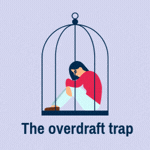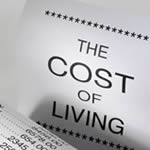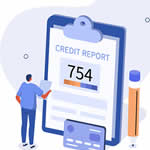The repayments on many loans and car finance are too high to be manageable so people get deeper into debt trying to repay them. When you applied, a lender should have checked a loan would be affordable for you - often they did not check properly and you should never have been given this loan. This article describes how to complain, with a template to use. Many people have won complaints … [Read more...]
Problem overdraft? How to ask your bank for a refund of interest
Have you had big overdraft problems for a long period? You can make an affordability complaint and ask for a refund of overdraft charges if: your overdraft limit was set too high at the start or increased to a level you are unable to clear; or your overdraft usage showed you were in long-term financial distress. For example, being in the overdraft all the time, or using an unauthorised … [Read more...]
“My DMP payment is too high”
A reader asked if it is OK to reduce your debt management payments when you need to? This is a common problem in Debt Management Plans (DMPs). Sometimes your income falls. Often your essential expenses go up faster than your pay does. In debt management, you pay a set amount to the DMP company and they divide it between your creditors. So what happens if you can no longer afford that monthly … [Read more...]
Is gambling wrecking your finances?
A gambling habit often starts small, some fun with your mates or a bit of excitement when you are bored at home. But soon you may be spending more than you can afford. Then your cards and overdraft are maxed out. It is so tempting to try to win back enough to clear the debts and pay your bills. You need money to do this, so you get a loan. But you lose more... Soon the only credit you can … [Read more...]
When can you get a default removed from your credit record?
"This default is destroying my credit score - how do I get rid of it?" This is a very common question! It's sometimes asked when people's finances have improved and they are trying to clean up old problems on their credit history as fast as possible. Or sometimes the default feels unfair for some reason. I will look at various cases to see what - if anything - can be done for each of … [Read more...]
The best free ways to check your credit score
Keeping track of your credit record is smart, but how do you go about it? With more than a dozen ways to check your credit record in the UK, it can get confusing. So, what are your options—and which are the best free ones? And is it ever worth paying for "extras"? Do credit scores actually matter? Not really. There is too much hype about credit scores. Lenders never see the score you see … [Read more...]
Car finance commission – can you get a refund?
There are now two different types of car finance commission complaints, "discretionary commission" and "undisclosed commission". In January 2024, the FCA allowed car finance firms to "pause" their handling of discretionary commission complaints. Then in October, a major appeal court case covered a completely different reason for asking for a refund of car commission - it was not fully explained … [Read more...]
Increasing the interest on a credit card – your rights
If your credit card has told you it is increasing the interest rate, sometimes you can simply reject this change and stay on the old rate. You don't have to repay it all immediately But you have to act fast to do this, so this article explains what you need to know. It also applies to catalogues, store cards and accounts such as Paypal. There are two situations in which a credit card can … [Read more...]
Will an affordability claim hurt my credit record, and other questions
People often ask what happens to their credit score if they make a complaint. And what happens if they still owe a balance on the account. Here are some typical questions: " Lloyds increased my overdraft limit several times a few years ago when I had a gambling problem. But I have recovered and am hoping to get a mortgage soon. I don't want to complain if it will it harm my credit score, which is … [Read more...]
When to send a Prove It letter about a debt
If you get a letter saying you owe money on a debt you don’t recognise, or which you thought you had paid off, you need to challenge the creditor to prove that you do owe the money. Also do this if you find a debt on your credit report yoiu know nothing about. Sometimes debt collectors have simply got the wrong person. This is sometimes called a mis-trace. This is what the Financial … [Read more...]
How to get refunds from catalogues and credit cards
Have you had a credit card, store card or catalogue where your credit limit was too high? So high that the monthly repayments were hard to manage and you got into more debt? For some people the limit was too high at the start. Others were originally given an OK limit, but the lender kept increasing it. or it was OK while the 0% offer lasted, then unmanageable. You may have a good … [Read more...]
Morses administration – more delays to the tiny distributions
Morses Club went into administration in November 2023. Morses Club was the largest doorstep lender in the UK after Provident stopped lending in 2021. See Morses Club goes under for details about why it failed. UPDATE Latest news on the future very small payments People who had been promised refunds of hundreds or thousands of pounds in the Scheme will now only get a very small amount. The … [Read more...]
How equity release works in an IVA
Are you in the last year of an IVA and have a house with equity? You may have to try to remortgage your house or get a secured loan to pay some of the equity into your IVA. This is called "equity release" This article looks at the questions people have about how equity release works in an IVA. An IVA that starts from July 2025 will probably be under the "2025 Protocol". This says that there … [Read more...]
What happens when you can’t afford IVA payments
If you can't make the payment to your Individual Voluntary Arrangement (IVA) this month, don't panic! There may be options for you to cope and get your IVA back on track. This is very common - five or six years is a long time for everything to go smoothly in your life. You do need to talk to your IVA firm,even if you know the problem is very temporary and you can pay a few weeks late. If … [Read more...]
“Will paying off debt improve my credit rating?”
Will your credit score improve if you can clear some debts? The answer is "Yes sometimes!": it will go up quickly if the main problem with your credit score is credit utilisation (you are using too much of your credit card limit) and you can reduce this signficantly ; it may go up a bit if the debts you will be paying off are defaulted or are in payment arrangements, but probably not a … [Read more...]
- 1
- 2
- 3
- …
- 14
- Next Page »














